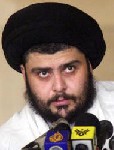 Almotamar.net Google
Almotamar.net Google - Moqtada al-Sadr has moved his family to a secure location because of fears he will become the target of a security sweep of Baghdad, it was reported Friday. News of the radical cleric's decision came after days the US military said it had detained a suspected death squad leader.
Aides to Mr. Sadr described the arrest of the man, named as Abdul-Hadi al-Darraji, as a "provocation", saying he was a spokesman for their movement.
"We are angry," Abdul-Mehdi al-Matiri told Reuters. "This is a kind of revenge. Sheikh Darraji deals with the media. He is not a military man."
A US military statement said the man had been arrested by Iraqi Special Forces, backed by US advisers, on suspicion of kidnap, torture and murder.
One of Washington's prime concerns is how to cope with the Mahdi Army - loyal to Mr. Sadr - and other Shia militia carrying out murders in Sunni communities in the Iraqi capital and elsewhere.
The Bush administration is putting pressure on the Shia-dominated government of the prime minister, Nuri al-Maliki, to stop Shia death squads. US officials allege that the squads sometimes have the tacit backing of Shia-dominated security forces.
The majority of an extra 21,500 US troops announced by George Bush are to be deployed in a planned security sweep of Baghdad aimed at curbing the sectarian violence.
In an interview with Mr. Sadr, published in the Italian newspaper La Repubblica today, the cleric said 400 of his men had already been arrested.
"For this reason, I have moved my family to a secure location. I even have had a will drawn up, and I move continuously in a way that only few can know where I am," he was quoted as saying.
"But even if I were to die, Mahdi would continue to exist. Men can be killed. Faith and ideas cannot," he said.
Mr. Sadr said his men would not fight during the Islamic month of Muharram, which marks the death of Muhammad's grandson Hussein, but that afterwards "we'll see".
A senior figure close to Mr. Sadr was shot dead by a US soldier during a raid in the Shia holy city of Najaf last month.
The cleric has publicly distanced himself from violence blamed on his Mahdi Army supporters, who are described by the US as the biggest threat to the security of Iraq.
There was no immediate comment from the Iraqi government about the latest arrest.
Mr. Maliki has in the past criticised raids on Shia groups conducted by Iraqi army Special Forces under the direct command of US officers, saying he has not been adequately consulted.
However, the prime minister has also been criticised by Sunni politicians and the Bush administration over his links to Mr. Sadr and a failure to disarm the Mahdi Army.
Fellow Shia leaders say they are negotiating to keep Mr. Sadr and his political movement inside the main Shia bloc in the Iraqi parliament while at the same time hoping to disarm his militia followers.
� The US defence secretary, Robert Gates, Friday arrived in Iraq for a visit to the southern city of Basra.
Mr. Gates was meeting the top US commander in Iraq, General George Casey, and the newly-arrived commander of British forces in Iraq, Major General Jonathan Shaw.
There are around 7,000 British troops in the area, though the UK plans to pull out a large proportion of these this year.
Mr. Gates will be talking to British, US and other commanders about how the security scenario in the Basra area would develop.

